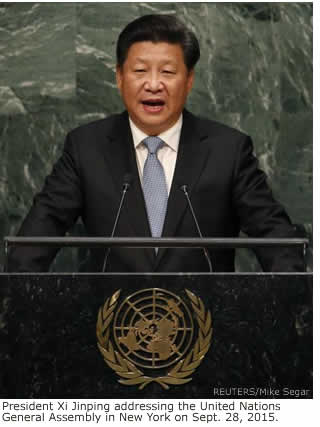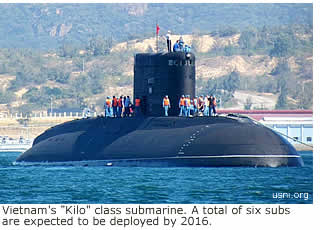 n September 28, 2015
Chinese President Xi Jinping addressed the world body during the 70th
session of the United Nations General Assembly, in New York. In his
speech Xi committed his n September 28, 2015
Chinese President Xi Jinping addressed the world body during the 70th
session of the United Nations General Assembly, in New York. In his
speech Xi committed his
 country to various laudable endeavors such as a
reinvigorated effort to curb greenhouse gasses and combat climate
change; a $100 million aid fund for Africa; and $1 billion for U.N.
development projects across the globe. country to various laudable endeavors such as a
reinvigorated effort to curb greenhouse gasses and combat climate
change; a $100 million aid fund for Africa; and $1 billion for U.N.
development projects across the globe.
The recurrent theme of the
Chinese president's speech was that China was prepared to play a
larger—and leading—role in the United Nations going forward. “We should
renew our commitment to the progresses and principles of the U.N.
Charter," Xi said. He went on to note that international relations
should be characterized by "win-win cooperation" between nations and a
"shared future for mankind."
Quite notable for
Filipinos listening to Xi's address was his admonition that “Big
countries should treat small countries as equals and take a right
approach to justice and interests by putting justice before interests.”
He further stressed that a country's sovereignty and territorial
integrity should not be violated, warning that countries that resort to
the use of force “will find that they are only lifting a rock to drop
on their own feet.”
While Xi's speech was
generally well received and drew the occasional applause from the
assembly, it is contradicted by China's extremely aggressive acts in the
West Philippine Sea (South China Sea). As a signatory to the United
Nations Convention on the Law of the Sea (UNCLOS)—which among other
things codifies the responsibilities as well as the rights of countries
with respect to their use of the world's oceans, and the management of
marine natural resources—China demands that its neighbors respect its 200
nautical mile Exclusive Economic Zone (EEZ). Unfortunately, China shows
little respect for the Philippine's EEZ. In instance after instance
China has used its large maritime vessels and naval warships to
intimidate Filipino fishermen and deny them access to fishing grounds,
shoals, and reefs, that lie well within the Philippine EEZ as defined by
UNCLOS. As far as China is concerned: "what's mine is mine" and
"what you think is yours is actually mine as well."
So China, it appears,
is not what Xi portrays it to be. After decades of relative peace in the
region, China by its hostile acts towards the Philippines—a weak, and
militarily insignificant country—is showing the world that it is in
reality an aggressor nation. A nation willing to openly assert itself
through military force on neighboring states that do not have the
wherewithal to stand up to it or fight back.
 Already, Asian nations like
Japan, Taiwan, South Korea, Vietnam, the Philippines and even India have
begun to beef-up their militaries in anticipation of China's
ever-increasing bullying tactics. Billions of dollars that could be used
for alleviating global poverty or reversing climate change—endeavors
that Xi says he wants to tackle—are instead being used to buy bigger,
more powerful, weapons of war. Already, Asian nations like
Japan, Taiwan, South Korea, Vietnam, the Philippines and even India have
begun to beef-up their militaries in anticipation of China's
ever-increasing bullying tactics. Billions of dollars that could be used
for alleviating global poverty or reversing climate change—endeavors
that Xi says he wants to tackle—are instead being used to buy bigger,
more powerful, weapons of war.
The 21st Century could
be the century of global enlightenment, peace, and prosperity, but China
appears to be singlehandedly pushing mankind back to the dark ages of
global strife and wars of aggression; a world where "might is right" and
the phrase "rule of law" holds no meaning.
As Xi noted in his
speech, those nations that resort to the use of force “will find that
they are only lifting a rock to drop on their own feet.” The question
is: will it be Xi's feet crushed by that heavy rock?
Published 9/29/2015 |